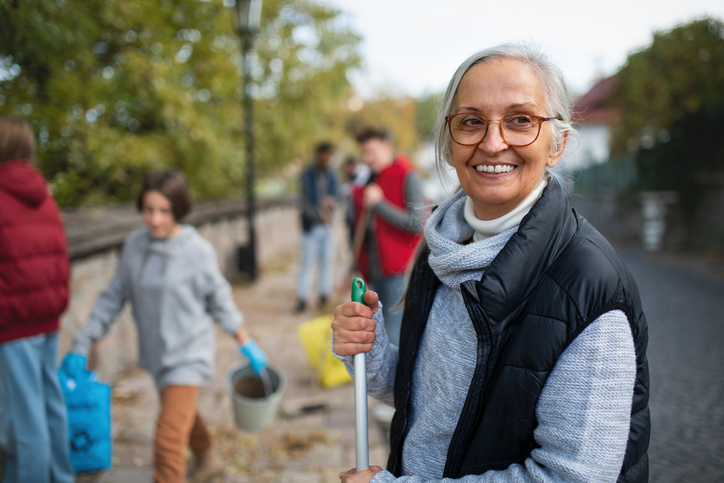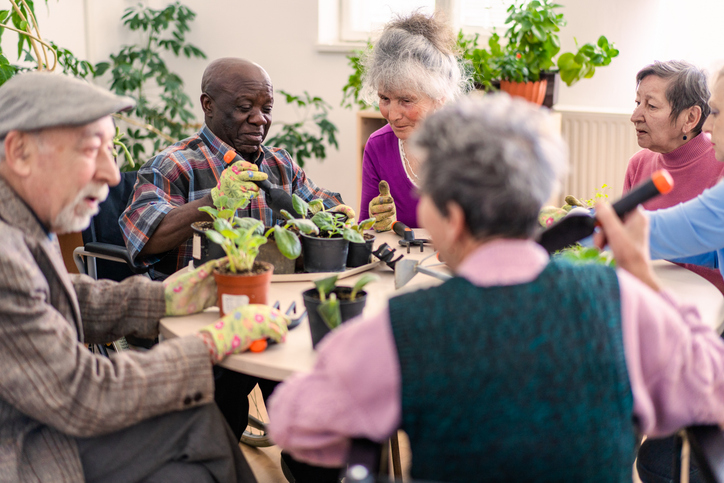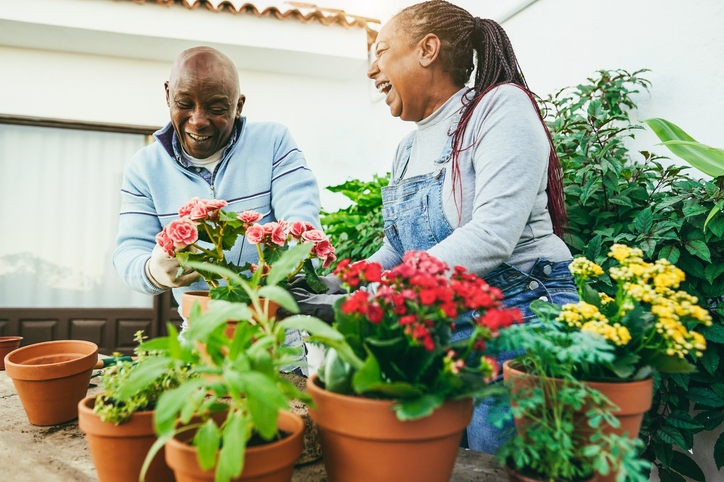Category: Mental Health
What to Do After a Loved One Dies
June 15, 2025

The loss of a loved one is one of life’s most stressful events. Almost ninety percent of people over the age of 16 have experienced grief, but 57% of Americans have experienced a significant loss within the last three years.
Mourning is the natural process someone will go through when a loved one passes away. Though many initially gather with friends and family to share the loss, the mourning process is personal and may last months or years.
Here are some gentle steps to take when processing the loss of a loved one.
Know the Symptoms of Grief
Dealing with death is something most people would rather avoid altogether, but grieving isn’t something to put off. Your grief is likely to be felt physically, emotionally, and psychologically. Allowing yourself to move through your feelings is integral to the process.
Give Yourself Time
Now is the time to take care of yourself. You don’t need to put an expiration date on your grieving. “Some people grieve for years, and while they become more functional as time goes on, they may still get hit out of nowhere with grief-related feelings,” says Dr. Judy Ho, host of the podcast Supercharged Life.
“Grief isn’t linear; it’s more circular. You may feel like you’ve accepted the loss, then something happens months later, and you circle back to denial,” says Ho. However long it takes you to begin feeling better is unique to your situation. So be gentle with yourself as you experience waves of mourning.
Routine is Everything
It is essential to develop and stick to a new routine. Many activities will feel different, and it’s okay to make changes accordingly and try new things. However, sticking to some of what’s normal for you can also be a great comfort. “Grief has a way of rocking our sense of safety, but routine creates stability, which often codes as safety,” says Dr. Anita Robinson, author of The Gift of Grief.
Lean on Your Support System
When a loved one dies, it affects everyone in their circle. “Don’t manage grief alone,” says Melissa Robinson-Brown, a clinical psychologist in New York. “If there were ever a time to lean on family and friends, this would be it.” Talk to those you feel most comfortable with and let them know what you’re experiencing.
While everyone finds their way to cope, it can be valuable to share the loss of someone and grieve together. People should be open and honest with one another and not try to hide their feelings. Because the roles of family members may change, it’s best to communicate with one another moving forward.
Bereavement Groups and Counseling
It may be helpful to join a bereavement support group. Bereavement means the state of having been deprived of something or someone valued, primarily through death. Being around others experiencing the same loss level helps many feel less alone. Hospices, hospitals, and community organizations will all have more information on support groups in your area.
One-on-one counseling can be an essential part of losing a loved one and processing that loss in a healthy way. Death can come as a great shock, and mental health counselors can offer a safe place for you to resolve those emotions. Through hospice, bereavement care is even provided for up to 13 months.
Experiencing the loss of a loved one can be a painful process. Focusing on the joy the relationship brought to your life is a great source of solace during the most emotional moments. With Insureyouknow.org, you may store your loved one’s records for safekeeping so that when it’s time to handle the logistics of someone passing, you’ll be up for the task.
How Much Sleep Do You Really Need?
May 1, 2025

You might pride yourself on burning the midnight oil or think you’re functioning fine on five or six hours of sleep—but your body would likely disagree. According to the CDC, a third of all adults in the United States report that they don’t get enough sleep, and that’s troublesome since the benefits of a good night’s rest are numerous. Sleep isn’t just downtime—it’s when your brain files memories, your body repairs itself, and your mood resets.
So how much sleep do you actually need to feel your best? It’s not a one-size-fits-all answer. While many people are under the assumption they can operate on less than seven hours of sleep a night, research shows that seven hours is just the bare minimum needed.
Here’s everything you need to know about how long you should aim to sleep nightly.
Seven Hours Isn’t Exactly the Golden Rule
According to the CDC, the average adult between the ages of 18 and 60 needs at least seven hours of sleep. “Some people need less than seven hours, while others might need more,” says Eric Zhou, a psychologist at the Division of Sleep Medicine at Harvard Medical School.
While people usually focus on the amount of sleep they need, they forget to consider the quality of sleep they’re having. For instance, you may go to bed at 11 p.m. with an alarm set for 6 a.m., but when do you actually fall asleep, and are you staying asleep all night?
“Instead of focusing exclusively on the number of hours we sleep per night, we should also consider our sleep quality,” says Zhou. It’s about the time you spend in bed every night, but it’s more about the amount of uninterrupted deep sleep you’re experiencing nightly.
Wearable sleep trackers, such as the Oura Ring, Fitbit, or Apple Watch, can provide valuable insight into your patterns and help you develop better sleep habits.
Women May Require More Sleep
The traditional estimate of nightly seven to nine hours of sleep is based on studies that only involved men. This has recently led many to wonder whether or not women need more sleep than men, and several factors suggest they may.
Since women are often caregivers, they are wired to multitask and use more of their brain, while they also report higher levels of stress. This mental exhaustion alone could account for them requiring slightly more sleep every night.
The other factor is hormonal, depending on where they are in their cycle each month, as well as during pregnancy and even after menopause. For instance, the hormone progesterone, which peaks at different times, is a relaxing hormone and often leads to drowsiness.
While not everyone agrees, many health professionals are beginning to recommend more sleep for women, who probably need at least eight hours of sleep a night.
Factoring in Age
The younger you are, the more sleep you need, especially when the body is growing or going through major changes. A newborn needs up to 17 hours of sleep a day, while a teenager between the ages of 13 and 18 needs up to ten.
As you age, melatonin production, which is the sleep hormone, declines. The result of less melatonin is waking up earlier or waking up throughout the night. Once over the age of 61, getting the recommended amount of nine hours of sleep can become more challenging.
How to Get a Good Night’s Sleep
Consistency is key for a good night’s sleep. Try maintaining the same time window between lying in bed and waking up. This works because the body recognizes routine and can be trained to sleep within a specific time frame. “People with good sleep quality often have a predictable sleep window where their sleep occurs,” says Zhou. “Good sleepers are likely to sleep around the same number of hours and stay asleep through the night.”
Physical activity during the day also influences how well you sleep at night. The more activity you incorporate into your day will directly correlate to how much sleep your body needs and therefore, how tired you’ll be by bedtime. “Activity increases your sleep drive,” says Dr. Michelle Drerup, a sleep medicine psychologist. “It’s important to develop exercise as a habit. Pick a time of day that works for you and exercise at the same time every day.”
Refraining from eating two to four hours before bedtime can also help. When we eat, the body must switch gears to digestion, so when you eat right before bed, you must focus on digesting that food and cannot fall into a deep sleep. Eating before bedtime robs your body of its capacity to concentrate on the work it does while you’re sleeping.
The same rule applies to nightly screen time. Studies show that two or more hours of screen time in the evening can disrupt the rise in melatonin you need to fall asleep. Turn devices off at least one hour before bedtime, and replace scrolling with reading a book, taking a bath, or meditating. If you must use your phone at night, reduce your blue light exposure by turning down the brightness or switching to nighttime mode in the evening.
Building a routine that you can stick to ensures the right amount of sleep every night is possible. With Insureyouknow.org, you can store your medical records in one easy-to-review place. The effort you put into a good night’s rest will show in time.
Everything to Know About Equine-assisted Psychotherapy
March 14, 2025

Horses are well known for the special connection they form with their owners, but bonding with horses is not only more accessible than ever, it can be healing. Beyond pet companionship, horses can be used in therapeutic settings to help people process challenging emotional experiences.
During equine-assisted psychotherapy (EAP), people may groom, feed, or lead a horse with a mental health professional nearby. The main goal of this form of therapy is to help patients with emotional regulation. EAP differs from traditional talk therapy as it offers a more inviting setting, brings people outside, and allows them to use all their senses while processing emotions.
How Horse Therapy Differs From Traditional Counseling
Unlike humans, horses bring different qualities to therapy. For example, horses cannot give patients a feeling of bias or judgement, but because they are sensitive to emotions, they still convey a sense of understanding and connection. “They’re sentient beings, and they think and feel and have incredible memories,” says Paige Deponte, director of an equine-assisted trauma-informed care organization in Honokowai, Hawaii. “They were made to do this.”
Plus, horses’ care, such as feeding and grooming, is therapeutic and helps build empathy. The horse’s unique nature gives people a better awareness of their emotions, increased adaptability, stress tolerance, and even self-esteem. “The goal is for the client to find out more about their needs through a series of questions,” says Depontei. “No session is ever the same.”
Horses Have Been Used in Therapy Throughout History
Hippocrates, the Greek physician known as the “Father of Medicine,” wrote about the therapeutic benefits of horseback riding around 400 BCE. Around the world, horses have even been used to heal specific physical ailments. Scandinavia used equine therapy to treat patients with myelitis in 1946, and in 1952, the Olympian Liz Hartzel credited the healing power of horses as helping her recover from polio.
Riding became a popular form of therapy in the 1950s and 1960s. The North American Riding for Handicapped Association was formed in 1969 and eventually became the Professional Association of Therapeutic Horsemanship International, recognized as PATH. By the 1980s, American and Canadian therapists created a more structured Hippotherapy model to be referenced for treatment.
The Benefits of Horse-Assisted Therapies
Equine-assisted forms of therapy are becoming more popular because of increasing evidence of their effectiveness. “I think it’s growing, and the benefits of it are commanding attention because it is unique,” says Whitney Diamond, who breeds and trains horses for a living. “A huge part of the reason why I believe that the therapy is so powerful with horses is that they’re so primal.”
It’s thought that since they’ve been domesticated for some time, horses are attuned to human emotions and nonverbal signals. This allows them to mirror what someone is feeling, enabling the patient to recognize their mental state. “A big part of therapy is that you must work with them,” says Diamond. “It’s powerful because you have this other being that’s not judging you, that’s working off synergy and energy, and they’re going to meet you where you’re at, good or bad.”
EAP is shown to be just as effective in children, teens, and adults and may be used to help with anxiety, depression, and trauma. EAP can benefit young children who find it challenging to open up and process painful experiences.
There are also physical benefits from working with horses. Caring for an animal is shown to decrease blood pressure and improve cholesterol levels. Horses in particular encourage socialization through other riders, which can lessen feelings of loneliness and isolation. Vigorous horseback riding is also a great cardiovascular exercise, while grooming the horse and taking care of equipment can help build strength.
How to Find a Treatment Center Near You
You may reference PATH Intl. or the Equine Assisted Growth and Learning Association to find an EAP certified professional. These are the most reputable organizations that set the standard, train, and certify anyone using horses as a part of therapy.
Those who are interested in trying EAP are advised to find a program that specializes in their specific difficulty, such as anxiety or trauma recovery. The mental professional at the given organization will then be able to tell potential clients whether or not they seem like a fit for the program.
If you have any physical limitations, especially back injuries, then EAP might not be the right fit for you. Other considerations include a fear of horses and the cost of therapy, which may not be covered through insurance.
If you or a loved one may benefit from equine-assisted therapy, you may look for an organization that takes your insurance or offers affordable care. With Insureyouknow.org, you may keep your medical records and progress reports in one easy-to-access place. By keeping track of the changes you notice during therapy, you can observe how you benefit from this unique form of connection in many different ways.
Lost a Job? Find Your Career Instead
March 1, 2025

After the shock of losing a job subsides, how can you ensure you are career-ready to jump back into the job market?
It’s important to remember that a job isn’t a career. A job is a piece of work you take to pay living expenses. A career is a long-term professional project that can span multiple jobs and pivots throughout your lifetime. For example, someone who loves working with numbers may take a job as a bookkeeper, but they want to build a career as an accountant. Even if they lose the bookkeeping job, they can still pursue the career of being an accountant with further professional development.
With 4 out of 5 workers worried about losing their job in 2025, changing your thoughts from “job search” to “career path” is the path forward. Here are some tips to ensure you are career-ready.
Take Time for Reflection
“Take the time to reflect on where you’ve been and where you want to go before jumping back into the job search,” says Sabina Sulat, author, podcast host, employment expert, and influencer. “If you don’t know where you’re headed, you can’t reach your goal.”
By taking a moment to consider the best next step in your career, you can avoid the trap of signing up for the same qualities that made you sigh with relief when you lost your last job.
Learn a New Skill
As you build a career, adding new tools to your skillset make you a more valuable employee. According to a study published in the Journal of Occupational Health Psychology, people who pursue mastery of a skill experience a more positive attitude and better sleep than those who just exercised or did nothing to alleviate the ongoing anxiety of job loss. Look around and see what skills to acquire to secure your next step in your career.
Pivot
A November 2024 Gallup poll reported that 51% of employees are dissatisfied and actively seeking a new job. Perhaps this last job revealed something you didn’t enjoy about your chosen career path. Now is the time to pivot! This time between jobs can be used to learn about another aspect of your career you hadn’t considered and pursue other opportunities.
Figure Out What You Want…And Ask for It
According to Eric Maisel, psychotherapist and author of Choose Your Life Purposes, we’re naturally reluctant to ask for what we want. “That reluctance at best reduces your enthusiasm and makes for a dry presentation, and at worst it prevents you from reaching out to your connections or to the jobs that interest you,” he says. “On top of all of the practical realities involved, the psychological ones matter a lot, too!”
Do the necessary research to determine what you want, monetarily and career-wise, and practice asking for what you need. You can do this by setting up practice interviews with friends and colleagues, journaling your thoughts, and practicing saying the words in front of a mirror.
Doing the necessary work to make yourself career-ready helps you realize your goals. “This clarity and confidence not only make you a stronger candidate but also shine through in your applications, interviews, and networking conversations,” says Sulat.
InsureYouKnow.org
With the recent rise in layoffs and higher unemployment, you must remain ready to pivot. After you’ve gathered your certifications and updated your resume and portfolio, store them safely using InsureYouKnow.org to keep them organized and easily accessible. Having these important documents at your fingertips makes accessing that next step on your career journey easier.
Volunteering for Seniors: Benefits & Opportunities
November 15, 2024

There are good reasons why more than one in five older adults volunteer. A study in the Australian Journal of Psychology found that the more people volunteer, the more their overall life satisfaction increases.
If you find yourself with the urge to help or give back to your community somehow, here’s everything you need to know about volunteering later in life.
Volunteering can improve your physical, mental, and spiritual well-being. The American Journal of Preventive Medicine found that if someone volunteered for at least 100 hours per year, or less than two hours a week, for at least four years, they experienced a reduced risk of mortality, less physical functioning limitations, higher amounts of physical activity, and positive psychosocial outcomes, such as a stronger sense of life purpose. “Volunteering is an affirmation that your time hasn’t ended. It’s also a way to affirm that careers are ongoing,” says Marcia Wall, a career coach. “Continue your career through volunteering, and you’ll continue to have that sense of professional identity that can continue even without getting a paid job,” she says.
Furthermore, volunteerism can prevent social isolation and loneliness, major risk factors for mortality among the aging population. In addition to having the opportunity to utilize the skills you already have, volunteering can provide the acquisition of new skills and knowledge, too. “It’s good for the mind, and for socialization; it’s the idea that we’re all lifelong learners,” says Wall. “There is value in learning for learning’s sake. The idea that our brains and our spirits are still active and you can’t be curious without having a spirit. It’s an affirmation that your time hasn’t ended,” she says.
What to Consider Before Getting Started
Before choosing a volunteer opportunity, think about your “why” and what kind of work you want to do. Read about an organization’s mission and the ways they go about achieving that. Does the work they carry out align with your values? Volunteering is a way to engage with your interests, so make sure that you look for an organization that makes you feel excited and even motivates you.
Then, check the reviews. Pay attention to positive and negative feedback and how the organization responds. Beware of any place that uses phrases like “work tirelessly” or seems understaffed or over-extended. “First and foremost, volunteers should not be considered ‘free labor,’” says Wall. “Volunteers are skilled and valuable contributors who are choosing to donate their time in exchange for a personal reward of some kind,” she says. Ultimately, it’s important for you to feel in control of the work you decide to do. Remember that it doesn’t have to be long-term; you can always pursue other avenues. Volunteering should never feel like a chore.
Six Options for Older Adults Looking to Volunteer
There are volunteer opportunities out there for everyone. Here are several ideas to get you started on your search.
- Local or National Charities
Always look at what’s in your backyard first. Habitat for Humanity, for instance, exists nationwide and helps families in your community establish stability and self-reliance by providing them with homes. Food banks always need assistance with daily tasks such as food delivery and donation gathering. Feeding America lists food banks in your area where you can begin. Charity thrift stores are another great way to help with a cause you care about. The items sold there benefit those who buy them, and the proceeds go toward the organization’s efforts.
2. Local, State and National Parks
The National Park Service is often eager to have new volunteers. Opportunities include helping with one-time special events or long-term commitments that involve tasks such as invasive plant removal or serving as a tour guide and educator.
If pets are your passion, working with your local animal shelter may be the right fit for you. While large, well-known organizations like the SPCA and The Humane Society of the United States are great places to work with, smaller local rescues need help, too. Volunteering with a rescue center may involve caring for and playing with animals, providing potential the public with information, cleaning, and helping at fundraising events.
4. Fostering Younger Generations in a Multitude of Ways
Did you know you could become a foster grandparent for a child living in your community? Fostering a child usually consists of tutoring, mentoring, and caregiving. If that kind of opportunity sounds rewarding, check with your local churches and Americorps for children in need of a foster.
Your local schools are another venue to check with for volunteering to help teachers, tutor children, or chaperone field trips. Eldera is another program that connects those over age 60 to help students with homework, while Big & Mini connects people with common interests intergenerationally. Yet another group is Career Village, which brings former professionals to students interested in those careers. If sports are of interest to you, then coaching a youth team is yet another way to give back to children in your backyard.
5. Providing Companionship to Older Adults
There are several ways to help people your own age, such as volunteering with your local Hospice agency. Hospice opportunities include being a companion to patients at the end of their lives, helping with clerical duties, or making things like fidget mats and quilts for patients. “You’re one on one with a patient or them and their family,” says Erin Long, a hospice volunteer services manager. “It’s individual volunteering and independent volunteering. We look for someone who is comfortable in independent situations.”
There are other ways to assist older adults, including being a companion to someone still living independently at home but needing a little support. Seniors Helping Seniors is just one organization that connects seniors to volunteers in their area. Hosting a meet-up for seniors in your area is another way to connect with people your age, build community among older adults, and even prevent loneliness. Starts at 60 Meet Ups helps volunteers host casual gatherings at coffee shops.
- Community Gardens
If you have a green thumb, gardening might be the right cause. Community gardens can contribute healthy foods to their community, beautify your hometown, and provide you with some health benefits. Working in the garden improves both physical and mental well-being. If your neighborhood needs a garden, then AARP can help you get one going.
Senior Corps links seniors with thousands of opportunities. And don’t forget about checking with family and friends, who may know where the local needs are. With Insureyouknow.org, you can keep all of your volunteering research in one place, as well as schedules and logs of the benefits you notice and your impact. Just remember that every act of kindness can create a lasting impact, no matter how small or large. If you’re interested in volunteering, there’s no better time than now to start your search.
Intergenerational Care Benefits Everyone Involved
September 29, 2024

September is Intergeneration Month, launched by The Intergenerational Foundation, to connect generations and urge people from varying age groups to socialize. The idea behind recognizing Intergeneration Month each September is to promote learning from each other, such as gaining a better understanding of history and the challenges that separate generations. By connecting with different age groups across generations, unlikely friendships form between those who would otherwise never have communicated with each other.
People balancing raising young children and caring for aging parents may consider looking into what intergenerational daycare can offer. Facilities that provide both child care and senior care are on the rise, and that’s probably because, in addition to being a convenient solution for caretakers, the benefits to each age group are numerous.
If you’re considering Intergenerational Care for your loved ones, here’s everything you need to know.
What is Intergenerational Care?
Intergenerational care centers provide care for both young children and older adults. “It’s also referred to as a ‘shared site,’” says Merle Griff, the director of McKinley Center Intergenerational Project. “In many cases, there’s a senior area on one side of the building, a child care area on the other, and a hallway connecting the two. At various points during the day, they come together,” she says. The care provided can take on several forms, but at the core, it’s a service offered to multiple generations to provide care in one place across age groups.
The benefits of multi-generational care include forming connections between people who have a lot to teach one another and who would have otherwise never been allowed to meet. “It brings younger and older people together to increase social connectedness, enhance well-being for the benefit of all ages, and strengthen the web of support that is so integral to families and communities,” says Sheri Steinig, the director of Generations United. “People of different ages come together to learn, play, grow, and interact in planned intergenerational activities as well as through informal encounters,” she says.
The Different Kinds of Intergenerational Care
While intergenerational care means care across generations, the services provided vary. “There are many settings for intergenerational care,” says Steinig. “There can be programs at community centers and schools or care in daycare centers, retirement communities, nursing homes or assisted living and affordable housing,” she says. You may even provide intergenerational care in the form of a multigenerational household where more than two generations live. One in four American households are already multigenerational.
Intergenerational care centers look more like daycare facilities with adult daycare services or nursing home locations. “Each center is run their own way,” says Griff. “There are typically planned, structured interactions during the day,” she says. Both age groups are usually not combined for the entire day. Daily intergenerational activities may look like a combined sport, arts and crafts activity, comparison presentations between then and now, or even cradling opportunities, where seniors are paired with infants to rock and soothe to sleep. To date, there are fewer care centers than intergenerational programs. While there are only 150 sites across the country, care centers are expected to grow in popularity. For instance, The Mount Intergenerational Learning Center, a Seattle preschool within a nursing home, reports having over 400 children on their waiting list.
Intergenerational care programs are structured pairings between children of various ages and older adults. Programs such as these are designed to foster relationships between youth and seniors. It could be a pen pal program between elementary school kids and seniors, college students visiting nursing homes, multi-age choirs, or veterans going to schools to talk to students about their experiences.
To find a program such as this or a care center in your area, Generations United offers a search tool.
The Benefits of Intergenerational Bonds
Many grandparents live thousands of miles away from their grandchildren while aging adults live several states away from their children. According to a study from the University of California San Francisco, 43% of older adults report experiencing loneliness, and those who feel lonely are at a 59% increased risk of declining health.
That’s when intergenerational care can help. Older adults experience a sense of purpose and renewal after spending time with and helping young people. It helps seniors feel like they are not just receiving care but offering care. “Despite the dementia diagnosis, the maternal and paternal instincts can still kick in, and the seniors feel a sense of purpose,” says Jenna Hauss, the president of ONEgeneration. “They can care for others. They don’t always need to be cared for,” she says.
It isn’t just older generations that benefit from the connection. Children who spend time around older adults have fewer biases around such things as walkers and wheelchairs and become more comfortable with these differences. Multigenerational care promotes sensitivity among both age groups. Parents notice that their children are more empathetic, while older adults experience less loneliness, reduced agitation, and improved overall health.
Intergenerational care addresses two important needs: early childcare and the increasing demand for senior services, but the benefits of this combined service reap rewards far beyond caretaking. Research is proving that both age groups experience different perks from intergenerational connections. If this sounds like it might be the right fit for you and your loved ones, Insureyouknow.org can help you search for care by storing all of your research, financial information, and medical records in one easy-to-review place.
Five Things Happy Retirees Have in Common
June 15, 2024

The transition into retirement can be difficult, when work no longer provides a sense of identity and accomplishment. The change can be startling, especially when most people don’t switch to part-time schedules on the way out of their full-time careers. “We don’t really shift our focus to, how do we live well in this extra time,” says M.T. Connolly, author of The Measure of Our Age. “A lot of people get happier as they age because they start to focus more on the meaningful parts of existence and emotional meaning and positive experience as finitude gets more real.”
While most people account for how much money they’ll need when it’s time to retire, there are many other factors to consider when planning for a fulfilling retirement. Here are five things that happy retirees have in common.
Feeling a Sense of Purpose
There are several approaches to staying active and finding purpose after leaving a career. “Your retirement schedule should be less stressful and demanding than your previous one, but we don’t need to avoid all forms of work or service,” says Kevin Coleman, a family therapist. “Find some work that you take pride in and find intrinsically meaningful.”
Many retirees, for example, choose encore careers, where instead of working for the money, they are working for the enjoyment of the job. Besides finding a new job, there are other simple ways to feel purposeful during retirement. Purpose can be found by making oneself useful, such as by volunteering in the community, joining a community board, or participating in an enjoyable activity with a group, like a gardening club. Many retirees enjoy volunteering to take care of their grandchildren or helping their older friends with caregiving duties. Finding purpose doesn’t need to be complicated and can be achieved through simple acts of showing up for others and being open to new connections.
Finding Ways to Connect
As nearly 25% of those who are 65 and older feel socially isolated, finding ways to connect are important for mental and physical well-being during retirement. One way to connect is through storytelling. Sharing our stories with the people we care about strengthens our social bonds and helps us feel less lonely. Storytelling also helps people pass down their family memories, especially when we share stories with younger relatives, such as with grandchildren. It’s a nice feeling to think that your memories will live on through your loved ones. “The models we have for aging are largely either isolation or age segregation,” says Connolly. “There’s a loss when we don’t have intergenerational contact. It impoverishes our social environment.” Perhaps the best thing to do as you age is to cherish and foster these relationships with younger relatives.
Making Plans for the Retirement Years
Budgeting for your retirement is crucial to happiness during the retirement years. Successful retirement planning includes paying off debts prior to retiring and saving for unexpected expenses or emergency funds in addition to a standard monthly budget. According to a survey conducted by Wes Moss, author of You Can Retire Sooner Than You Think, the happiest retirees are those who have between $700,000 and $1.25 million in liquid retirement savings, such as stocks, bonds, mutual funds, and cash. His research also found that retirees within five years or less of paying off their mortgages are four times more likely to be happy in retirement. This is because the mortgage payment is typically the most significant expense, so those retirees who own their homes feel safer and more at peace once they no longer have that bill. Plus, not having a mortgage payment due every month dramatically lowers their monthly expenses and can help retirement savings last longer.
Many retirees overlook retirement planning beyond their finances. New research from the Stanford Center on Longevity shows that where someone lives in retirement can affect their longevity. Researchers found that people over the age of 60 who lived in upper-income areas lived longer due to having more access to health and social services. They also credited strong social networks and a sense of community to living longer. So perhaps there’s a city or area that you’ve always dreamed of living in or you’d like to live closer to family. Think about where you want to live when you’re done working and then plan for it before you retire.
Beyond saving up and thinking about where you want to spend your retirement years, setting goals for once you’re in retirement is equally as important. “Research suggests that those who think about and plan for what they will do in retirement in advance are far happier and fulfilled once they actually retire and begin living this phase of life,” says financial planner Chris Urban. “Sometimes it is helpful for people to write down what they plan to do every day of the week, what goals they have, who they want to spend time with and what they want to do with them.”
While your goals before retirement were likely centered around career and finances, it will be important to set different kinds of goals once you’re retired. Having goals doesn’t become less important just because you’re no longer working. “If you really want something, maybe a new romance, then take a concrete step in that direction,” says psychiatry professor Ahron Friedberg. “Don’t ever tell yourself that it’s too late.”
Prioritizing Both Physical and Mental Health
With a full-time career no longer on the schedule, cooking healthy meals at home, getting enough sleep, and finding ways to be more physically active everyday will be easier. It will also be important to keep up on medical appointments and preventive therapies. A study conducted by Harvard shows that even people who become more physically active and adopt better diets later in their lives still lower their risks of cardiovascular illnesses and mortality more than their peers who do not. “Not all core pursuits include physical activity or exercise, but many of the top ones do. I refer to them as the ‘ings’—walking, running, biking, hiking, jogging, swimming, dancing, etc.,” says Moss. “These all involve some sort of motion and exercise.” The most sustainable form of physical activity will be doing more of those activities that you enjoy and that move your body.
In addition to caring for your physical health, focusing on your mental health is just as important, especially as you age. According to Harvard’s Medical newsletter, challenging your brain with mental exercise activates processes that help maintain individual brain cells and stimulate communication between them. So choose something new or that you’ve always wanted to learn. Take a course at a community college or learn how to play an instrument or speak a language. If you enjoy reading, visit the library every week for a new book. If you enjoy helping others learn, then looking into a part-time tutoring job or volunteering to tutor is a way to challenge yourself mentally, connect socially, and feel a sense of purpose.
Prioritizing your overall health includes asking for help when you need it. If you reach a point where you need assistance with daily tasks and activities, then you shouldn’t hesitate to ask for help early. Whether it’s family members or caregiving services, finding help with the things that are becoming difficult for you is the best way to maintain your independence for as long as you can so that you may continue to thrive during your retirement years.
It’s important to think about how you want to spend your retirement before it’s here. While many people only consider their finances when they begin to plan for the future, there are other factors, including how you’ll spend your time, where you’ll live, and your overall health that will impact the quality of your retirement years. With Insureyouknow.org, storing all of your financial information, medical records, and planning documents in one easy-to-review place will help you plan for what can be the best years of your life.
Gardening for Mental Well-Being
May 15, 2024

Interest in gardening has increased since the pandemic, as more and more people are searching for ways to disconnect from stressful times and reconnect to nature. It turns out that immersing ourselves in green spaces and caring for plants is a form of caring for ourselves. Time spent in nature has been found to improve mental health so much so that gardening has been prescribed by the National Health Service in Great Britain since 2019. But while scientists are just beginning to pay attention to nature’s overall effect on our health, humans have known about the power of gardening for a very long time.
Historic Gardens and Horticultural Therapy
Ancient and modern gardens all over the world, including Persian pleasure gardens, Islamic paradise gardens, Chinese courtyard gardens and Japanese rock gardens, nurture a sense of separation from the chaotic world and provide a place for inward reflection. In addition to sources of food, the Roman Empire treated gardens as a place to cultivate mindfulness. As extensions of the home, Roman gardens were the first outdoor rooms. They served as spaces to rest and marvel at nature’s wonder. By the Middle Ages, hospital gardens modeled after these Roman gardens were seen as integral parts of the hospital, not just to feed patients and grow medicines but to offer patients time outside. But as efficiency and technology took over medical treatment, these spaces went extinct.
Still, the benefits of gardens were not forgotten. In the 1800s, early American psychiatrists began noting links between horticulture and mental health. Born in 1933, the famous neurologist Dr. Oliver Sacks believed that gardens and nature were more powerful than any medication. As the scientific evidence of spending time in green spaces leading to better health grew, many hospitals began incorporating gardens into their facilities again and horticultural therapy was developed as a therapeutic practice in the 1970s.
Horticultural therapy involves taking care of plants with specific goals for the patient in mind. For instance, tending to a garden and watching it thrive can help people build self-esteem and feel a sense of accomplishment. Gardening can also lead to life lessons, such as when a plant dies, the person can ask themselves, “What could I have done differently?” Connecting the garden to themself can lead them to think that maybe they can do a little more to take care of themself, too. “It’s really the plants that are the therapists,” says Laura Rumpf, a horticultural therapist who treats patients with dementia through gardening. “Even if somebody can’t necessarily name what it is they’re smelling, the body somehow remembers.” For those with dementia for instance, plants can help them to reminisce which leads to telling stories and sharing memories, an important part of connecting to others and validating their identity.
The Scientific Proof of Nature’s Benefits
Gardening involves exercise, which we know is beneficial to our health, and since people tend to breathe more deeply when they’re outside, outdoor activities can clear the lungs, aid digestion, and improve immune responses. Sunlight also lowers blood pressure and increases vitamin D levels, but the benefits of outdoor gardening extend beyond these physical benefits.
A recent study conducted by scientists at the University of Florida found that gardening lowered stress, anxiety and depression in healthy women who attended a gardening class twice a week. “Past studies have shown that gardening can help improve the mental health of people who have existing medical conditions or challenges,” said the principal investigator of the study Charles Guy. “Our study shows that healthy people can also experience a boost in mental well-being through gardening.” In addition to improved mental well-being, interacting with nature has proven cognitive benefits. A 2019 study by University of Chicago psychologist Marc Berman showed that green spaces near schools promote cognitive development in children, while adults assigned to public housing in green neighborhoods exhibited better attentional functioning than those assigned to units with less access to green spaces.
Scientists have a few ideas as to why nature is so good for our mental health. One hypothesis is that since our ancestors evolved in the wild and relied on their environment for survival, we have an innate drive to connect with nature. As a species, we may be attracted to plants because we depend on them for food and shelter. Another hypothesis is that spending time in nature triggers a physiological response that lowers stress levels. Throughout human history, trees and water have been an oasis and signaled relaxation. There is an implicit trust in nature that calms our parasympathetic nervous system. Yet a third hypothesis is that nature replenishes cognitive functioning, which restores the ability to concentrate and pay attention. The truth probably lies in a combination of all of these theories.
Gardening Against Loneliness
Perhaps one of the most overlooked yet obvious benefits of gardening is that it can make people feel less alone in the world. While gardening can bring people together through community gardens, one doesn’t even need to be around other people while spending time in nature in order to feel more connected to others. “Nature can be a way to induce awe,” said psychology professor John Zelenski. “One of the things that may come from awe is the feeling that the individual is part of a much bigger whole.”
Gardening can bring people together through a sense of community, as people who garden are rich with expertise that they are willing to share with other gardeners. Master gardeners and local volunteers dedicate their time to empowering other people in the community who are interested in growing their own plants. Simply sharing a gardening blunder is just one way to connect with a fellow gardener. Social connections are important for our mental well-being because they help lower stress, improve resilience, and provide support, while a strong sense of belonging has been shown to lower one’s risk of depression and anxiety.
Community gardens are a great place to connect with others as they offer room for talking during uncomplicated and repetitive tasks. Since gardening can bring together all kinds of people, time in the garden with others can also remind us that we are more alike than not. “Gardens are a great point of connection,” said the director of a London community garden Sarah Alun-Jones. “We often find ourselves talking about where we grew up, our childhood gardens, food we like to grow and cook… and we learn lots along the way.”
If you’re thinking of incorporating gardening into your routine, it doesn’t need to be intimidating. Simply starting by potting indoor plants or taking walks in green spaces during your lunch break are just two simple ways to connect with nature now. At Insureyouknow.org, you may store all of your gardening plans and records, so that you can become the researcher of your own gardening benefits.
(AI)ding the Elderly with AI
January 24, 2024

Forget the golden age, artificial intelligence (AI) is bringing a new silver lining in healthcare. It is revolutionizing health services across the nation and improving patient care, specifically for the elderly population. According to the World Health Organization, AI technology is improving the fields of medicine and public health for older individuals by anticipating potential health risks, fueling drug development, and supporting the personalization of healthcare management.
“Though adoption of AI has been delayed in mental health research and clinical care relative to other fields, it could potentially enhance diagnostic, prognostic, and treatment approaches for the growing aging population,” said Dr. Helmet Karim, assistant professor of psychiatry and bioengineering at the University of Pittsburgh. “With ubiquitous usage of wearable sensors, advancements in explainable AI, and growing acceptance of AI in medicine, these approaches could support increasing clinical demands.”
Here are a few ways AI is helping seniors enter the digital age.
Daily Care & Wellness Monitoring
Scientifically validated AI in-home care solutions like People Power Family are revolutionizing home care, nursing facilities, and assisted living centers by helping older adults in their everyday tasks. This technology can track and collect the health data of individuals to ensure their well-being by detecting falls and changes in behavior that may indicate that an individual has a specific health condition.
AI devices are also being used to monitor patient health from cameras to motion sensors to wearables. Organizations such as SafelyYou are utilizing AI-based fall detection technology to continuously track patient movements and alert staff, effectively decreasing ER visits. On the other hand, CarePredict designs wearable wrist devices that can track an elderly patient’s daily activities including walking, bathing, eating, visits to the bathroom, and periods of sleep.
Managing Medication Schedules
Many elderly individuals face difficulties when it comes to adhering to their medication schedules. AI-powered medical reminder apps such as mPulse Mobile are game changers in that area. They ensure that elderly patients follow their medication regimen, which decreases the likelihood of potential hospital admissions and helps improve patient health outcomes.
Such technologies not only help patients in the short-term, but they also foster the creation of long-term health plans. AI utilizes patient data to predict an individual’s overall response to different forms of treatment and creates a beneficial medication schedule. This method helps increase patient-centered care within the medical field, establishing the welfare of patients.
Guidance During Medical Challenges
AI technologies can help empower patients by providing them with information, support, and guidance for managing specific health conditions. For example, a chatbot called “Vik” was created to help breast cancer patients navigate their diagnosis. This device provides patients with a variety of information through personalized text messages, ranging from comprehensive medical statistics and treatments regarding breast cancer to lifestyle and diet to patients’ rights.
Additionally, AI-powered systems can also detect conditions that go untreated like dementia and late-life depression. Such systems can potentially identify patients with symptoms of certain mental health conditions and provide them with timely information on treatment plans as well as tips on managing their health.
Companionship and Personal Interaction
According to the PEW Research Center, 27% of adults ages 60 and older live alone in the U.S., which indicates that many elderly individuals are in need of social interaction or companionship. AI technologies like ChatGPT can actually be trained to provide emotional and social support to the aging population. For instance, loved ones can set up and customize ChatGPT, ensuring that conversations are targeted to a person’s needs such as news updates, story sharing, light-hearted banter, and more.
But that is not all. Researchers have bigger plans for AI when it comes to the seniors. Dr. Lillian Hung, a researcher at The University of British Columbia and founder of IDEA lab (Innovation in Dementia & Aging) recently introduced AI-powered social robots to West Vancouver’s Amica senior living facility as part of her study. She found that AI-powered social robots have the potential to engage with elderly patients, mitigating their feelings of social isolation and loneliness. This daily interaction can alleviate psychological distress, decrease feelings of anxiety and depression, lower agitation, promote positive facial expressions, and enhance an individual’s overall mood on an everyday basis.
“It [AI robot] sings with you, plays with you, dances with you, follows you – just makes sure you feel that you’re loved,” said Dr. Hung about the adorable robots that have helped some shy residents come out of their rooms. There have been talks of making such robots permanent residents of the facility.
Increased Independence
As more seniors age in place, smart home devices enhanced with AI-powered features are revolutionizing households into spaces that address the needs of every resident. These devices offer support in various ways, including turning lights on and off, adjusting temperature, detecting smoke, monitoring behavior and health, reminding about medications, detecting falls, and even initiating emergency calls.
“AI and sensor data can derive patterns and alerts that inform care, for example, combining sensors with data about individuals that have a history of falls, AI tools can detect bed, chair, and room exits which require immediate response,” said Laurie M. Orlov, principal analyst, Aging and Health Technology Watch.
A few other AI apps listed below can also help seniors live healthier, safer lives:
- Caspar.ai: identifies 10+ health conditions even before symptoms are noticed
- CareDaily.ai: is a fully integrated home health
- CareSmartz360: helps seniors with activities of daily living and communication
- Inspiren: is a healthcare technology company specializing in AI-powered solutions to improve outcomes
- VirtuSense.ai: is a proactive AI that makes healthcare simple, affordable, and accessible
- KamiCare: is an easy-to-install fall management solution
- Sagely: assists with engagement programs in senior living communities
InsureYouKnow.org
Artificial intelligence is playing an increasingly important role in the healthcare industry by giving older individuals the chance at a new life. This revolutionary technology helps monitor health, creates efficient medication schedules, bolsters social interaction and personal care, and allows elderly patients to be more independent. With insureyouknow.org, you can keep track of the data AI helps collect to improve your health outcomes. With the assistance of AI, seniors are experiencing a digital revival and upgrading to a new level of well-being.
Dealing with Mental Stress During the Holidays
November 22, 2023

For most people, the best parts of the holidays, extravagant decor, rich foods, gift-giving, and additional time with friends and family, can also be the most stress inducing. While the holidays are thought of as the most wonderful time of the year, it is in fact viewed by many as the most stressful time of the year.
Neverending to-do lists, added expenses, and the desire to achieve a perfect holiday are just a few of the ways that the season brings on an overwhelming amount of stress. Plus, if you have an existing mental health condition, the holidays may accentuate it. “There are a lot of stressors in life without the holiday season,” says event planner Courtney Lutkus. “The holidays can be triggering and make it worse.”
In order to have a more relaxing holiday season, it’s important to choose some strategies ahead of time that will help you combat seasonal stress.
Exercise is Often the Best Medicine
During the holidays, prioritizing regular exercise can mitigate stress before it happens. Whichever exercise you choose, taking the time to move your body will guarantee a healthy dose of holiday cheer.
If you tend to feel restricted during the holidays from being spread too thin both physically and mentally, dance therapist Erica Hornthal recommends what she calls joy workouts. Take a break from the festivities, find an open space, and spend eight minutes moving through six expanding moves, including reaching, swaying, and jumping, that are designed to boost happiness. “Shake your hands, shake your head — kind of like an animal after it gets wet,” she says. “You can make a game out of it if you have kids.”
Alternatively, if you feel the need to slow things down, then yoga might work best for you. Even a fifteen minute session can lower levels of stress and anxiety. With a focus on breathwork and mindfulness, yoga can be especially effective for alleviating the feelings of nonstop commotion that often come with the holidays.
If you find yourself wanting to get away, a walk or run around the neighborhood may be just what you need to reset. You could even plan a “microadventure,” which could be as simple as a bike ride in the dark or a daytime hike at a nearby nature reserve. Viewing things in a new light and admiring your surroundings can create a sense of awe, which has been proven to lower stress levels. Plus, spending time outside, even if it’s just a walk around the block, can lower cortisol levels, blood pressure, and muscle tension.
Schedule Breaks
If you’re having difficulty finding time for yourself during busy days, then reclaiming your mornings might be the best way to fit in a break. “I encourage everyone to develop a daily habit of starting their day with their own voice as the primary driver for how they want to engage the day,” says therapist Chanel Dokun. “This is an easy way to pre-schedule ‘me-time’ amid a busy holiday season where you can check in with your own needs, set your own priorities, and move into your day feeling centered and in control.” Plus, research shows that waking up just one hour earlier lowers an individual’s risk for depression by 23 percent.
In addition to making time for yourself in the mornings, simply saying no to yet another social obligation could help you avoid the burnout that comes from overdoing it. The sheer volume of things to do during the holidays can make it difficult to prioritize what’s most important. Sometimes, taking care of your mental health can be more important than attending yet another event, so give yourself permission to choose your festivities wisely. Not only will saying no to some things ease your stress, but it can also reinforce healthy relationship boundaries, which will leave you feeling empowered rather than burnt out.
Honor Your Routine
With all of the added hustle and bustle, it will be easy to fall out of your usual routine, but sticking to your routine might be the simplest solution to seasonal stress. Dr. David Spiegel, director of the Center on Stress and Health at Stanford University, says that our stress responses are far more flexible when we are resting and nourishing our bodies. “Mitigate stress by taking care of your body first,” says Spiegel. Give your body something to depend on during the holiday rush by getting enough sleep, eating well, and exercising regularly.
It would be impossible for every part of the holiday to be perfect, so why place that standard upon yourself? Think about what traditions matter most to you, such as cooking a specific meal for your children or visiting family. When you take the time to think about what matters most, you can either ditch the items that fall down on your to-do list, or you can ask other family members to take some tasks off of your plate.
“You have a lot going on,” reminds psychologist David Rakofsky. “You can’t possibly do it all. Instead of lamenting your ‘losses,’ congratulate yourself on the everyday victories, like leaving the bed, smiling, and putting on pants.”
Whether you’re counting on your travels to go just as planned, finding the perfect gifts, or hosting the event of the season, having an idealized approach can set you up for disappointment. When you let go of your vision for the perfect holiday, you may find that you have far more joy this season, as well as far less stress.
Stick to a Holiday Budget
The best way to manage financial stress is to set a realistic budget. Since nearly 1 in 4 people feel financially burdened by the holidays, there may be no better time to employ a budget than this time of year. “Be realistic when creating a budget by using real prices, not ballpark figures,” says Family and Community Health specialist Joyce Cavanagh. “Don’t forget to include travel, food and entertaining costs in your holiday budget. And remember to jot down what you’ve bought so you don’t lose track of how much you’ve spent.”
Due to inflation, lower-income households may experience more financial stress this year. 29 percent of consumers say they’re stressed about the cost of holiday shopping, and 14 percent feel pressured to spend more than they’re comfortable with. Talking with your loved ones about minimizing holiday spending and gift-giving could take the pressure off of everyone and put the focus back on celebrating with loved ones. “Try managing your anxiety through transparency and planning,” says psychiatrist Dr. Georgia Gaveras. “You may end up being a hero this holiday season if you propose limiting the number of gifts everyone buys.”
While you concentrate on the most wonderful time of the year, Insureyouknow.org can help you keep track of everything from financial records to travel itineraries and schedules. This season, stay organized when things get chaotic, and give yourself space to be present for all of what the holidays offer.
